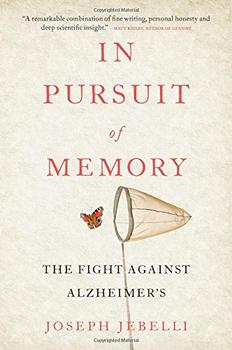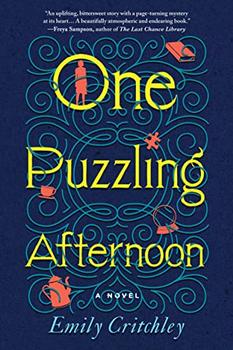Summary | Excerpt | Reviews | Beyond the book | Read-Alikes | Genres & Themes | Author Bio

The Fight Against Alzheimer's
by Joseph JebelliDebut author and neuroscientist Joseph Jebelli has a personal stake in the fight against Alzheimer's disease: his beloved grandfather, Abbas, succumbed to it back in Iran in 2012 after seven years of slipping into strange and forgetful behavior. With the world's population aging, it is expected that by 2050 Alzheimer's will be the second leading cause of death after heart disease. What to do in the face of what Jebelli calls a "global and inescapable epidemic"? You might expect a book like this to be depressing, but instead it is reassuring to see how our understanding of dementia and the genetics of diseases has advanced in the last century (see 'Beyond the Book') and just how many research avenues are open and promising.
Alzheimer's disease is so named after its discoverer, German psychiatrist Alois Alzheimer. When he presented his findings in November 1906, he had been studying his fifty-something patient Auguste Deter for four years. "I have, so to speak, lost myself," she would often say to him. Her memory loss and paranoia fit with physicians' previous understanding of dementia, but her younger age and the particular changes in her brain discovered in a post-mortem revealed novel variations. Two distinct markers of the Alzheimer's brain, along with an overall loss of brain tissue mass, are plaques – dark areas between nerves – formed of tangled cell surface proteins called beta-amyloid. The average life span with the disease is just eight years from diagnosis.
In the century or so since Alois Alzheimer's work, there have been various theories about what triggers the disease. John Hardy of University College London hypothesized that the beta-amyloid plaques come first and other symptoms follow, whereas Allen Roses of Duke University pointed to a surprising connection with liver protein APOE4, which interferes with blood sugar uptake and thereby deprives the brain of energy. There has even been an attempt to make an Alzheimer's vaccine, though Dale Schenk's two clinical trials failed at the phase 3 stage, in 2002 and 2012. It was also reported in 2012 that a skin cancer drug had moderate success in treating Alzheimer's. So there are numerous scientific routes available to neurology researchers, and despite the many setbacks new ideas are always in the pipeline.
Along with tracing the history of our knowledge of Alzheimer's and speaking with scientists who are at work on treatments, Jebelli spends time with ordinary people with the disease, such as Carol Jennings. In 1986 Jennings wrote to St. Mary's Hospital, London, offering her family for research purposes. Dementia had affected her father and two of his siblings. At this point it wasn't known whether Alzheimer's was genetic, but the Jennings family was a useful case study that contributed to the discovery of an "Alzheimer's gene." Jennings devoted 30 years of her life to promoting research and awareness, but then succumbed herself. By the time Jebelli met her in 2015, the change in her mind was stark: "Here, in front of me, was a woman who had transformed our understanding of the disease...Now, she was scarcely able to say its name."
Jebelli's writing style is comparable to that of Siddhartha Mukherjee, Ed Yong and Atul Gawande. His prose is perhaps not quite as lively and literary as theirs, but his book's importance outweighs any minor infelicities of style. What matters most is that he conveys scientific facts in a clear way the layman can understand; in addition, as in Mukherjee's The Gene, he balances history and research with a personal medical story almost any reader can relate to. It's easy to feel overwhelmed about Alzheimer's given that it may one day affect one in three people, but Jebelli is hopeful: he believes we will see a cure in our lifetimes, and significant progress within perhaps as little as a decade. Even those who don't normally choose popular science or medical-themed books owe it to themselves to read this.
![]() This review
first ran in the November 15, 2017
issue of BookBrowse Recommends.
This review
first ran in the November 15, 2017
issue of BookBrowse Recommends.

If you liked In Pursuit of Memory, try these:

by Claire Oppert
Published 2024
A celebrated art therapist plays the cello for her patients—and offers a moving reflection on the extraordinary power of music to enrich our lives, all the way to the very end.

by Emily Critchley
Published 2023
A mystery she can't remember. A friend she can't forget.
Your guide toexceptional books
BookBrowse seeks out and recommends the best in contemporary fiction and nonfiction—books that not only engage and entertain but also deepen our understanding of ourselves and the world around us.